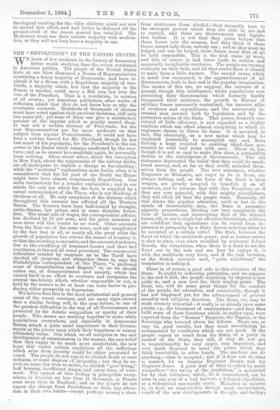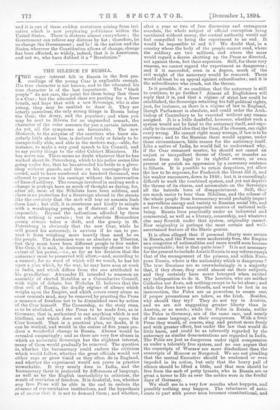THE "REVOLUTION" IN THE UNITED STATES.
WE know of few incidents in the history of democracy better worth studying than the recent revolution in American politics. The people of the United States have at one blow dismissed a House of Representatives containing a heavy majority of Democrats ; and have re- placed it by a House with a Republican majority of two- thirds, a majority which, but that the majority in the Senate is smaller, could carry a Bill into law over the veto of the President. That is a revolution, in opinion at all events ; yet American politicians, after weeks of reflection, admit that they do not know how or why the revolution occurred. Hundreds of thousands of electors must have voted against their previous decisions, still only two years old ; yet none of them can give a satisfactory account of the impulse which so greatly moved them. It was not a sudden distrust of Free-trade, for the new Representatives are far more moderate on that subject than regular Protectionists. It could not have been a sudden hatred for Mr. Cleveland, though he has lost much of his popularity, for the President's is the one power in the States which remains unaffected by the over- turn; and as he cannot be a candidate again, he personally loses nothing. Ideas about silver, about the corruption in New York, about the suppression of the railway strike, are all inadequate to explain a change so far-reaching ; while the " sectional" explanations seem feeble, when it is remembered that but for part of the South the House might have been almost unanimously Republican. One seeks instinctively for a broader explanation ; and to our minds the only one which fits the facts is supplied by a casual correspondent of the Timer, who is not thinking of elections at all. He only complains of the distress which throughout this summer has afflicted all the Western States. The farmers have been half-ruined by drought, cattle-disease, low prices, and in some districts forest- fires. The usual rate of wages, the correspondent affirms, has declined by 50 per cent., and for great numbers of men there will this winter be no work. Other accounts from the East are of the same tenor, and are complicated by the fact that in all, or nearly all, the great cities the growth of population has outrun the means of housing it, so that the crowding is excessive, and the amount of sickness, due to the overfilling of tenement-houses and their bad ventilation, is beyond all usual precedent. The commercial difficulties created by suspense as to the Tariff have checked all progress, and altogether there is, says the Philadelphia correspondent of the Times, "a profound sense of dissatisfaction and disgust," or, as we should rather say, of disappointment and anxiety, which has vented itself in an effort to overturn and reorganise the central machinery, which, whether responsible or not, is held by the masses to be at least one main factor in pro- ducing either prosperity or depression. We believe that this is the most substantial and general cause of the recent overturn, and see many signs abroad that a similar feeling will, in the near future, be one of the greatest difficulties in the way of all Governments not protected by the Asiatic resignation or apathy of their people. Two causes are working together to make white populations everywhere, and especially in democratic States, attach a quite novel importance to their Govern- ments as the pivots upon which their happiness or misery ultimately turns. One which we all recognise is the now development of consciousness in the masses, the new belief that they ought to be much more comfortable, the new hope that under certain conditions all the sufferings which arise from poverty could be either prev,ented or cured. The people do not expect to abolish death or even sickness, or seine degrees of inequality ; but they do ex- pect, on some day soon to arrive, to abolish " poor living," bad housing, insufficient wages, and every form of over- work. in spread of this feeling is perceptible every- where, n America no less than in Germany, in France even more than in England; and as the people do not expect the change from Providence, or from any altera- tion in their own habits—except perhaps among a class, There is, of course, a good side to this elevation of the State. It ought to redevelop patriotism, and we suppose in the end it will, the people acquiring by degrees a new pride in, and a new love for, their mighty giant. The State, too, will do some great things for the comfort of the people, for education, and conceivably, though it has not happened yet, for the advancement of general morality and religious devotion. The State, too, may be made serenely impartial—it really is so already upon some points, e.g., the treatment of combinations—and may thus fulfil some of those functions which, in earlier ages, were expected from the " Roman " Emperor, the Papacy, or the Sovereign who towered above his fellows. Those are, or may be, good results, but they must nevertheless be accompanied by corollaries which are not good. If the people expect so much from the State, or a party in control of the State, they will, if they do not get it, unquestionably be very angry, very impatient, and very much disposed to trust the power which they think irresistible, to other hands. The machine can do i anything,—that is accepted ; and if it does not do what is wanted, let us dismiss Engineer Brown and try i Engineer Jones. A good deal of what is called by acute wirepullers " the swing of the pendulum," is accounted. for by that irritation, which, be it remembered, can be born in one year of a bad harvest, a defeated expedition, or a widespread mercantile crash. Mutation in opinion is, in fact, an unavoidable, though most inconvenient, result of the new developments in thought and feeling; from abstinence from alcohol—they naturally turn to the strongest powers which they are able to see and to control, and these are Governments and legisla- tive bodies. It is not that they quite believe that these forces rule the seasons, but they think if these forces cannot help them, nobody can ; and as they must be helped, and can be helped, these forces must first of all be held responsible. This is the first cause at work, and this of course in bad times leads to sudden and apparently inexplicable overturns. The people are turning restlessly on their beds, and all that covers them is altered to make them a little warmer. The second cause, which is much less recognised, is the aggrandisement of all Governments, both in fact and in the popular imagination. The causes of this are, we suppose, the increase of a general though thin intelligence, whole populations now perceiving their Governments which formerly hardly recognised their existence, the growth in Europe of military forces necessarily centralised, the increase alike of revenues and expenditures, and the enormously in- creased area covered. both by legislation and by the protective action of the State. That power, formerly con- sidered of little efficiency, is now regarded as a mighty machine which can effect almost everything to which its engineers choose to direct its force. It is accepted, in fact, like electricity, as a new motor which may be employed potentially to accomplish any end, from driving a huge ironclad to enabling third-class pas- sengers to read bad print with ease. There is, too, i though it is not so easy to make this clear, a perceptible decline in the retiringness of Governments. The old statesmen deprecated the belief that they could do much, loved secrecy, and, so far as they could, secluded. them- selves from the people. The new statesmen, whether Emperors or Ministers, are eager to be in front, are always talking, and, as the force of the State is their weapon, are greatly tempted to brandish it on all occasions, and to promise that with this Excalibur, or if they are very peaceful, with this mighty ploughshare,. they will effect all that the people want. Naturally, all this draws the popular attention, until at last in the minds of innumerable men, the State is assuming- gigantic proportions, blotting out very completely the view of heaven, and interrupting that of the natural forces, till, to use a single but effective illustration, millions are confident that agriculture can be raised from de- pression to prosperity by a State decree ordering silver to. be accepted at a certain ratio! The State becomes the Saint to which the multitude prays ; and as human nature is slow to alter, even when moulded. by universal School Boards, the temptation, when there is a flood to set the Saint out in the rain and see how he enjoys it, is with the multitude very keen, and if the rain becomes, as the Scotch minister said, " quite ridicklous," the temptation is indulged. 'and it is one of these sudden mutations arising from irri- tation which is now perplexing politicians within the United States. There is distress almost everywhere ; the Government can relieve any distress by fiat ; therefore, let us change the Government ; and lo l in the nation and the States, wherever the Constitution allows of change, change has been effected, so widely, indeed, that it is Americans, and not we, who have dubbed it a "Revolution."



















































 Previous page
Previous page